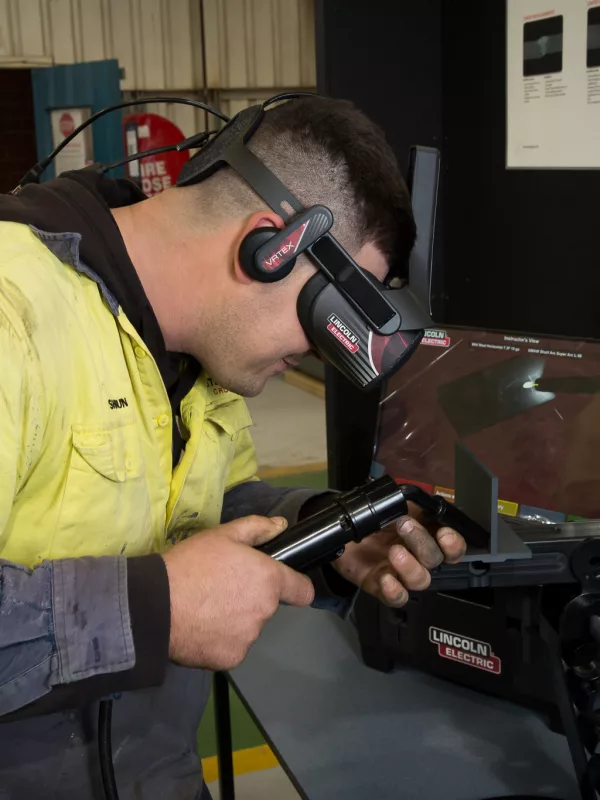Engineering (Fabrication and Welding, Mechanical, Production)
 MEM20105 - Certificate II in Engineering
MEM20105 - Certificate II in Engineering
 MEM30219 - Certificate III in Engineering
MEM30219 - Certificate III in Engineering
Mechanical Trade
 MEM31922 - Certificate III in Engineering
MEM31922 - Certificate III in Engineering
Fabrication Trade
 MEM40119 - Certificate IV in Engineering
MEM40119 - Certificate IV in Engineering
 MEM20422 - Certificate II in Engineering Pathways
MEM20422 - Certificate II in Engineering Pathways
Engineering Pathways

Welding
Welding is a career choice in strong demand in the manufacturing, industrial and construction industries. You could find yourself working in diverse environments, from factories to oil rigs, on-site and even underwater.
How do I become a welder?
South Australia has robust manufacturing, construction, and mining industries, and there is high demand in the submarine-building industry. To pursue a career in welding in Australia, you must obtain MEM30319 - Certificate III in Engineering - Fabrication Trade under an apprenticeship.
Before you dive into an apprenticeship, if you want to find out if welding is for you, consider these three short courses, which will teach you the basic skills and safety protocols for whichever type of welding interests you. The course you choose will depend on the project you have in mind.
The three courses are:
These face-to-face practical courses are delivered once a week with no formal assessment and introduce you to manual welding techniques, including safety and standard joint welding. You will receive a Statement of Attainment upon completion.
Generally, ARC welding is considered a good option for beginners looking for a method to complete quick repairs. It’s one of the most straightforward options to set up and learn and works best for outdoor projects.
If you’re interested in motor vehicle repairs, learning MIG welding will be helpful. It’s also handy for general maintenance because it’s faster and more economical than ARC welding. However, it is a more technical process than ARC welding and may take longer to master.
TIG welding delivers a smooth and detailed finish for projects requiring precision. A highly skilled process, TIG welding is mainly used by experienced welders.
Careers in welding
Welding is used across many industries and permits you to specialise in multiple areas. Some of the careers where welding is the primary qualification include:
- Boilermaker
- Metal Fabricator
- Pressure Welder
- Welder
- Fitter-welder
- Plastics Fabricator
- Structural Steel Welder
You will work with metals in a high-heat environment as a welder, so you must understand and adhere to safety guidelines. Manual dexterity and physical fitness are essential requirements for a welder as you work with your hands and sometimes in awkward locations.
You will also need to understand machinery and technical drawings to assess faults with machinery before welding.
Entry Requirements
To participate in any of these courses, you must be at least 16 years of age, able to read, write and understand basic English and perform simple mathematical calculations. Welding is a physical occupation, so you need to be able to conduct the tasks.
Personal Protective Equipment (PPE) requirements
Participants supply their own steel cap safety boots and safety glasses, non-flammable trousers, long-sleeved work shirts, welding gloves, and welding helmets.
Mechanical Engineering Tradesperson
As a Mechanical Engineer, you will learn many diverse skills you can apply across various industries, such as manufacturing, construction and maintenance. By taking a Certificate III and above course, you will learn not only the practical skills of welding, cutting and using handheld tools, but you’ll come away with knowledge of technical drawing, dismantling and rebuilding mechanical equipment and using computer-controlled precision machinery.
Some of the careers for Mechanical Engineering tradespeople include:
- Fitter and turner
- Toolmaker
- Boilermaker
- Mechanical Fitter – Aviation
- Plant Mechanic
- Fluid Power Mechanic
All of these roles are highly physical and have the potential to be located across many different types of workplaces, providing you with plenty of variety. Undertaking an apprenticeship is a highly successful and proven way to learn on the job and secure your future employment prospects.
Certificate and Apprenticeship Courses
For all courses listed below, the same entry and PPE requirements apply as the Statement of Attainment courses listed above.
MEM20422 - Certificate II in Engineering Pathways
This is a full-time course (5 days a week) with a duration of ten and a half weeks and will prepare you for a career in the Engineering trades. This course provides a grounding in all aspects of basic welding plus skills like teamwork, understanding environmental impacts and occupational health and safety. This course is highly recommended for those wishing to find apprenticeship opportunities.
MEM20105 - Certificate II in Engineering
This is a one-year (12-month) Australian Apprenticeship Training Contract. Additional entry requirements apply, and you must have already signed an approved contract with an Australia Apprenticeship Support Network. Applicants can be 15 years of age or older if participating in a school-based apprenticeship training contract.
After this course, you will have learned via both theory and practical training through trade school, self-paced study and placement at on-the-job training, and we will conduct assessments in all of the above.
MEM30219 - Certificate III in Engineering - Mechanical Trade
This is a four-year (48-month) Australian Apprenticeship Training Contract, teaching you skills required for employment within the mechanical trades. You will come away prepared for the repair and replacement of engineering components using a variety of machines and their upkeep.
MEM31922 - Certificate III in Engineering - Fabrication Trade
This program is also offered as a four-year (48-month) Australian Apprenticeship Training Contract. The skills learned in the Certificate III in Engineering Fabrication stream focus on the layout and design of structures and completing fabrication work by learning to use tools and machinery to cut, saw, bend metal - sheet metal work, blacksmithing and surface finishing.
MEM40119 - Certificate IV in Engineering
A higher level of qualification, this course is generally conducted in the same amount of time as Certificate III but serves to provide a more detailed Engineering understanding to work at a higher level such as a Special Class Engineering Tradesperson Mechanical.



